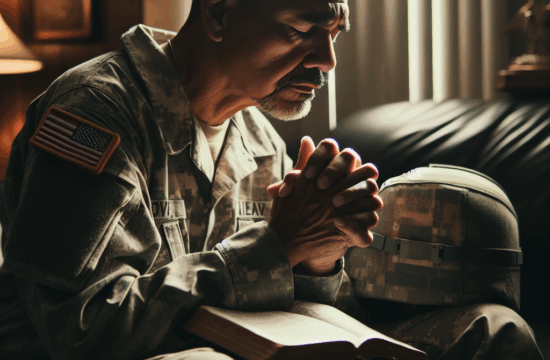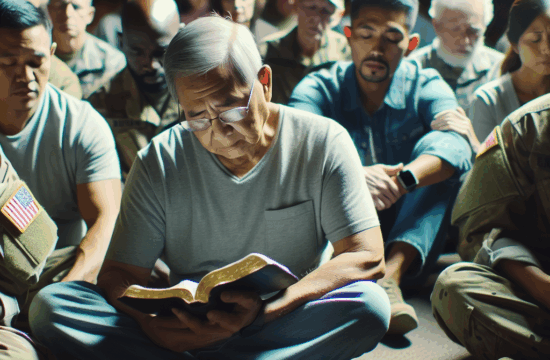==> Thank you for reading this post! Click Here If you are looking for support and Victory over PTSD.
Faith and Spiritual Resilience
Understanding the Role of Faith
Let me tell you, faith plays a massive role in healing, especially for war veterans. It’s not just about believing in a higher power; it’s about that connection that provides hope and strength. I’ve seen firsthand how leaning into faith can change a person’s outlook on life. It’s like a warm blanket on a cold night, wrapping them in comfort and security.
When I started talking to veterans about their experiences, quite a few mentioned how important their faith communities have been. These relationships offer them a safe space – a place where they can vent, share stories, and find solace in each other’s company. There’s something incredibly powerful about knowing you’re not alone in your struggles.
Lastly, returning to spirituality can help veterans process their experiences. It’s not just prayer; it’s about finding meaning in what they’ve gone through. Many veterans report that this journey allows them to turn their pain into purpose, encouraging others who might be struggling.
Community Support through Church
Community is a biggie! Every time I visit a local church that supports veterans, I’m reminded of how much love and care everyone shows. These communities often open their doors to veterans, providing support groups, counseling services, and even one-on-one mentorship that helps with the healing process.
The best part? It creates a sense of belonging. Many veterans feel isolated, and when they find a church that embraces them, it’s like coming home. They can feel the warmth of camaraderie as they share their experiences, and this connection plays a significant role in healing.
I’ve personally connected with veterans who mentioned how church activities, like retreats or volunteer work, have helped them build new friendships and find new purpose. These activities are so beneficial, promoting camaraderie and healing simultaneously.
Prayer and Meditation
Now, let’s dive into something that’s deeply personal to me: prayer and meditation. When dealing with trauma, I found that taking a few moments to center myself in prayer can make all the difference. It’s calming, grounding, and allows for a moment of reflection. Veterans I’ve met have expressed similar sentiments; taking time to pray can be like hitting a reset button.
Additionally, meditation has gained traction as a healing practice. Mindfulness and meditation can help reduce anxiety and stress. It’s a simple yet profoundly effective tool—just getting quiet with your thoughts can help veterans process their experiences.
I even stumbled upon guided meditation specifically designed for veterans. By tapping into visualization techniques, these methods can transform traumatic memories into skills that forge new pathways in their minds. If you’ve never tried it, I highly recommend giving it a shot!
Forgiveness and Letting Go
The Power of Forgiveness
Forgiveness, for many, can be a hard concept to grasp, especially when dealing with the pains of the past. In my work with veterans, I’ve found that forgiveness is more about freeing oneself than about the other party involved. It’s an act that allows veterans to detach from the anger and bitterness that can weigh them down.
When veterans share their stories, often, they speak about forgiveness, whether it’s forgiving themselves for decisions made in combat or forgiving others who may have wronged them. This act allows for immense emotional release, and it paves the way for healing.
Helping veterans find this space to forgive can be transformative. It’s like shedding a heavy coat on a hot day. Once they let go, they often report feeling lighter, more free, and ready to embrace the future.
Letting Go of the Past
Letting go isn’t just about forgiveness, though; it’s about moving forward. I remember listening to stories about how difficult it is for veterans to not let the past define their present. The pain from traumatic experiences can be overwhelming.
But learning to let go can unlock new potential. When a veteran accepts that their past doesn’t dictate their future, they begin to see the world with new eyes. I’ve witnessed many grow from being stuck in regret to embracing hope and moving towards goals they once thought impossible.
Providing support, whether through mentorship or community engagement, can be pivotal in this journey. It encourages veterans to look forward, not back, and reminds them that they have a life waiting for them beyond the scars of war.
Service and Purpose
Finding New Purpose
Everyone needs a sense of purpose, right? For veterans, rediscovering what makes them tick can mean the world in their healing journey. I’ve seen countless individuals find fulfillment in service post-military, often channeling their skills into something positive.
Many choose to volunteer or work with organizations that support fellow veterans or active troops. This of service fosters a feeling of camaraderie and continues their mission of supporting others—even when they’re not in combat. It’s heartwarming to see them light up when they talk about how they can help others.
Get Support and Help with Recovery! Visit us for more Information and Support
On a personal note, when I’ve helped veterans find volunteer roles, it’s been amazing to witness that spark reignite in their eyes. They go from feeling lost to feeling valuable again, and that’s a powerful transformation!
Spirituality in Action
Service to others is a profound way to express spirituality. It speaks volumes about faith when veterans dedicate their time and energy to lift others. I often share with them that by helping others, they’re not only healing themselves but also participating in something greater.
Being involved in community service can reinforce a sense of belonging that many veterans yearn for. On top of that, it cultivates a deeper understanding of life’s interconnectedness. It’s beautiful to see veterans realize that they can inspire hope not just through words but through action.
It reminds me how essential it is to keep giving back to the community that has supported them. This ongoing cycle of giving and receiving becomes part of their healing journey, creating a sense of unity and shared purpose.
Emotional and Mental Healing
Counseling and Therapy
Counseling isn’t a sign of weakness; it’s a tool for strength. I’ve witnessed many veterans struggle with the idea of seeking help. However, once they do, it can be life-changing. Whether it’s group therapy or one-on-one counseling, these sessions provide a critical space for veterans to share their stories and learn coping strategies.
There’s something special about getting to talk through experiences with a professional who understands. Many veterans have expressed relief in being able to articulate feelings they’ve bottled up for years. Once they start this journey, they often find that the path to healing is much smoother with support.
It’s important to find therapists who specialize in trauma and military experiences. They can offer tailored techniques to address these unique challenges, making the healing process feel directed and effective.
Developing Healthy Coping Mechanisms
When emotions run high, it’s essential to have healthy ways to cope. I’ve chatted with veterans who turned to art, music, or exercise as outlets, and it’s honestly inspiring. These activities not only serve as distractions but also express their feelings in constructive ways.
Actually, participating in these activities helps to foster emotional connections. Something as simple as creating art can lead to monumental breakthroughs for veterans grappling with emotions they thought were too painful to confront.
Encouraging veterans to explore varied coping methods can lead them on a self-discovery journey. It’s about finding what resonates with them personally, whether it’s through hula hooping, painting, or journaling their stories. Every step they take is a step forward toward healing.
Conclusion
To wrap it up, the journey of Christian healing for war veterans is multifaceted. Through faith, community support, forgiveness, service, and emotional healing, many have found pathways to recovery that are empowering and transformative.
If you’re a veteran or know someone who is, I encourage you to embrace these steps and explore what resonates with you. Remember, you’re not alone, and there’s a community out there ready to walk with you. Healing is possible!
Frequently Asked Questions
-
What is the role of faith in healing for veterans?
Faith can provide hope, a sense of belonging, and a connection to something greater than oneself, which can be immensely comforting for veterans during their healing journey.
-
How can community support help veterans?
Community support offers a safe space for veterans to share their experiences, connect with others, and find camaraderie, which is crucial for emotional healing.
-
What are effective coping mechanisms for veterans?
Effective coping mechanisms include engaging in creative activities like art or music, physical exercise, and developing a mindfulness practice through meditation or prayer.
-
Is forgiveness an essential step to healing?
Yes, forgiveness can be a powerful act of self-liberation, allowing veterans to free themselves from the emotional burden of anger and regret, which is critical for their healing journey.
-
How can volunteering aid in a veteran’s recovery?
Volunteering can help veterans find purpose and reinforce their connection to community, which promotes healing. It allows them to give back and share their experiences in a meaningful way.













